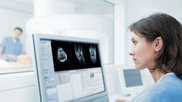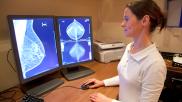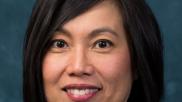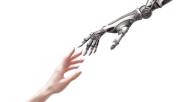| Today's News and Trends | As radiologists continue to embrace a more tech-savvy generation of medical students, adapt to life alongside artificial intelligence (AI) and churn out practice-changing studies, just one thing is missing, according to researchers in the Journal of the American College of Radiology: more women. As radiologists continue to embrace a more tech-savvy generation of medical students, adapt to life alongside artificial intelligence (AI) and churn out practice-changing studies, just one thing is missing, according to researchers in the Journal of the American College of Radiology: more women. | | |
| Seeking second-opinion interpretations of breast imaging studies in patients not presently diagnosed with breast cancer can provide significant value, according to a new study published by the Journal of the American College of Radiology. Seeking second-opinion interpretations of breast imaging studies in patients not presently diagnosed with breast cancer can provide significant value, according to a new study published by the Journal of the American College of Radiology. | | |
| Researchers from the department of radiology at Mayo Clinic in Jacksonville, Florida, thought they could shorten their facility’s standard recovery time for outpatient parenchymal liver biopsies from three hours to two hours—so they put it to the test. Researchers from the department of radiology at Mayo Clinic in Jacksonville, Florida, thought they could shorten their facility’s standard recovery time for outpatient parenchymal liver biopsies from three hours to two hours—so they put it to the test. | | |
| Radiologists, clinical oncologists and industry stakeholders gathered May 16 in London to discuss artificial intelligence (AI) in medical imaging and cancer treatment. The all-day event was organized by the Royal College of Radiologists (RCR) with help from the Alan Turing Institute, Health Data Research UK and the Engineering and Physical Sciences Research Council. Radiologists, clinical oncologists and industry stakeholders gathered May 16 in London to discuss artificial intelligence (AI) in medical imaging and cancer treatment. The all-day event was organized by the Royal College of Radiologists (RCR) with help from the Alan Turing Institute, Health Data Research UK and the Engineering and Physical Sciences Research Council. | | |
| Though not the guideline-recommended route for treatment, select breast cancer patients could benefit greatly from MRI screenings designed to identify brain metastases, according to a research letter penned this month by Dana-Farber/Brigham and Women’s Cancer Center experts and published in JAMA Oncology. Though not the guideline-recommended route for treatment, select breast cancer patients could benefit greatly from MRI screenings designed to identify brain metastases, according to a research letter penned this month by Dana-Farber/Brigham and Women’s Cancer Center experts and published in JAMA Oncology. | | |
| The American College of Radiology (ACR) has announced that Ruth C. Carlos, MD, MS, will be the new editor-in-chief of the Journal of the American College of Radiology (JACR), officially beginning her term in January 2019. The American College of Radiology (ACR) has announced that Ruth C. Carlos, MD, MS, will be the new editor-in-chief of the Journal of the American College of Radiology (JACR), officially beginning her term in January 2019. | | |
| Fetal MRI can accurately diagnose holoprosencephaly as early as 18 weeks into a pregnancy, researchers from the Children’s National Health System in Washington, D.C., reported this week, providing parents with added time to prepare for the realities of caring for a child with complex care needs. Fetal MRI can accurately diagnose holoprosencephaly as early as 18 weeks into a pregnancy, researchers from the Children’s National Health System in Washington, D.C., reported this week, providing parents with added time to prepare for the realities of caring for a child with complex care needs. | | |
| A new partnership between University College London Hospitals and the Alan Turing Institute aims to start using artificial intelligence (AI) to perform certain tasks typically carried out by doctors and nurses. A new partnership between University College London Hospitals and the Alan Turing Institute aims to start using artificial intelligence (AI) to perform certain tasks typically carried out by doctors and nurses. | | |
| |
|
| ![]() | |
|










